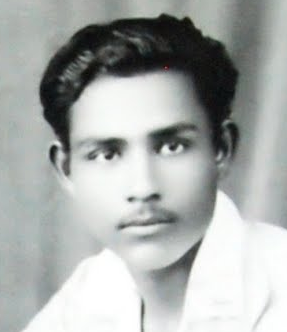Gajanan Madhav Muktibodh
Gajanan Madhav Muktibodh (गजानन माधव मुक्तिबोध) (1917-1964) was one of the most prominent Hindi writers of 20th century, and one of the pioneers of modern Hindi poetry. His contribution to Indian literature marked the beginning of Experimentalism (प्रयोगवाद) and Modernism (नयी कहानी / नयी कविता).
Muktibodh was born in a Maharashtrian family but his works were majorly in Hindi.
His writings got their due acclaim with the publication of fist edition of Tar Saptak (Upper Octave) in 1943. Tar Saptak was an apparent breakaway from the prevalent Chaayavadi thought the upholders of which strived to revive the myths of the Sanskrit traditions. Muktibodh did not however, outrightly rejected Chaayavadi tradition and picked those elements from it which could be meaningfully integrated into contemporary coherence. In his famous work ‘Brahmarakshas ’,-the latter refer to a class of demons mentioned in the Kathasaritsagara and the Panchatantra. It was about a man who is wandering about in a city trying to seek his existence, manage his knowledge gets absolutely mired in his own sense of perfectionism, unending calculations and subjective interpretation of the external reality that he loses touch with the reality, eventually dies and fades away in oblivion.
Some of his famous works are: Brahma-rakshasa , Chand ka Muh Teda hai , Andhere Mein , Bhuri Bhuri Khak Dhul, Ek Sahityik ki Diary. He is remembered as a bridge between the Progressive thought and Modern Poetry Movement.
Muktibodh led a difficult life and was surrounded by financial woes throughout. His success never abated his troubles as he was always seen struggling to make ends meet. The reflections of his life and his deep discontent were often seen in his writings.


